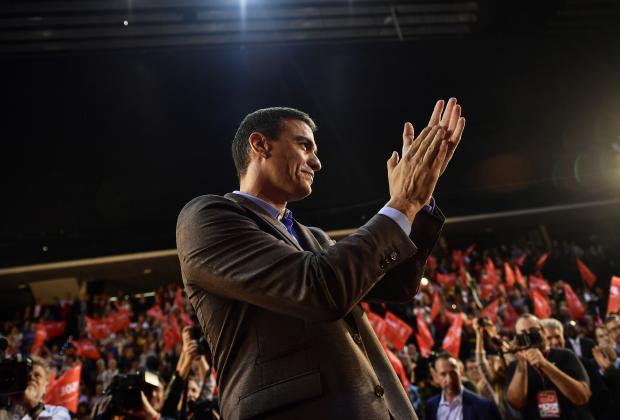Spain faces more uncertainty after inconclusive election

In this photo, taken Nov. 1, 2019, Spain’s caretaker Prime Minister and socialist candidate Pedro Sanchez applauds socialist followers during a general election campaign rally in Pamplona, northern Spain. Sanchez’s Socialists won Spain’s national election on Sunday, but large gains by the upstart far-right Vox party appear certain to widen the political deadlock in the European Union’s fifth-largest economy. (Photo by Alvaro Barrientos / AP)
MADRID — Spain looked set Monday to face months more political uncertainty after the country’s fourth elections in as many years further complicated an already messy political situation, giving no party a clear mandate to govern while the far right became a major parliamentary player for the first time in decades.
Incumbent Prime Minister Pedro Sánchez’s Socialists won the most seats — 120 — but fell far short of a majority in the 350-seat chamber and will need to make deals on several fronts if they are to govern.
Sánchez called Sunday’s election after he failed to gain enough support to form a government in the previous election in April.
In his victory speech Sunday, he promised again to “obtain a progressive government.” His plans to do that may emerge when he meets his party’s executive later Monday.
Despite poll predictions to the contrary, Sánchez had hoped the poll would give him a stronger footing but he actually saw his party seat count drop by three while his closest allies, the far-left United We Can, dropped from 42 to 35.
Article continues after this advertisement“Sánchez fails in his plebiscite and makes government even more difficult,” was the front-page headline in Spanish daily El Mundo.
Article continues after this advertisementThe next step will be for parliamentarians to select a house speaker in the coming weeks and for talks then between King Felipe VI and party leaders to begin so that one of them, most likely Sánchez, will be called on to try to form a government.
The election’s other bombshell came with right-wing voters flocking to the far-right Vox party, giving it 52 seats to become the parliament’s third force, behind the Socialists and the conservative Popular Party, which won 88 seats.
Right-wing populist and anti-migrant leaders across Europe celebrated Vox’s strong showing.
Vox’s surge and the gains by the Popular Party capitalized on Spanish nationalist sentiment stirred up by the Socialists’ handling of the secessionist conflict in the northeastern region of Catalonia, the country’s worst political conflict in decades.
Many right-wingers were also not pleased by the Socialist government’s exhumation of late dictator Gen. Francisco Franco’s remains last month from his gargantuan mausoleum so he could no longer be exalted in a public place.
The Catalan issue promises to continue festering with three Catalan separatist parties winning a combined 23 seats Sunday.
Many Catalans have been angered by the Supreme Court’s prison sentences last month for nine Catalan politicians and activists who led a 2017 drive for the region’s independence. The ruling triggered massive daily protests in Catalonia that left more than 500 people injured, roughly half of them police officers, and dozens arrested.
On Monday, Catalan radicals resumed the protests by blocking a major highway border pass between France and Spain and promising to keep it cut off for three days.
/atm